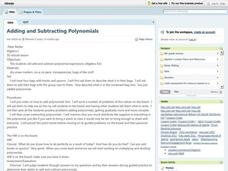02 x 02 Worksheets
Dividing Polynomials Using Algebra Tiles
Discover how algebra tiles can help in dividing polynomials. Pupils watch as instructors demonstrate how to use algebra tiles to solve problems involving the division of a quadratic expression by a linear expression. Once they get the...
Curated OER
Dividing Polynomials
In this Algebra II/college level worksheet, students use long and synthetic division to divide polynomials and use the Factor Theorem to show that a given polynomial is a factor of a polynomial function. The two page worksheet contains...
EngageNY
Comparing Methods—Long Division, Again?
Remember long division from fifth grade? Use the same algorithm to divide polynomials. Learners develop a strategy for dividing polynomials using what they remember from dividing whole numbers.
EngageNY
The Division of Polynomials
Build a true understanding of division of polynomials. Learners use their knowledge of multiplying polynomials to create an algorithm to divide polynomials. The area model of multiplication becomes the reverse tabular method of division.
West Contra Costa Unified School District
Polynomial Division
How do you apply the traditional division algorithm to polynomials? Here is an Algebra II lesson that extends the use of the division algorithm to polynomials. After establishing the concept of long division, synthetic division and the...
Curated OER
Dividing Polynomials
For this dividing polynomials worksheet, students simplify polynomials containing approximately six terms. Students divide polynomials. This four-page worksheet contains 20 problems. Answers are provided on the last page.
West Contra Costa Unified School District
Polynomial Division
Multiply the ways your scholars can find the quotient with polynomial division. A lesson plan introduces polynomial division via long division, synthetic division, generic area model, and using the definition of division. Learners then...
Mt. San Antonio Collage
Synthetic Division and Zeros of Polynomial Functions
More than just a worksheet, this guide provides the description of many of the polynomials theorems to assist the learners. Starting with synthetic division, class members are then guided through the remainder theorem and linear factors.
Virginia Department of Education
Multiplying Polynomials Using Algebra Tiles
Tiles are not just for algebra—see how they can help with multiplication too. Young mathematicians learn to use algebra tiles to model the multiplication of polynomials. A follow-up worksheet provides practice with the skill.
EngageNY
Dividing by (x – a) and (x + a)
Patterns in math emerge from seemingly random places. Learners explore the patterns for factoring the sum and differences of perfect roots. Analyzing these patterns helps young mathematicians develop the polynomial identities.
Rice University
Elementary Algebra
Find all the Algebra 1 content in one location. A helpful eBook contains the content typically found in an Algebra 1 course. Concepts range from solving and graphing linear equations to solving and graphing quadratic equations. Pupils...
Curated OER
Polynomials
In this algebra worksheet, students multiply 14 polynomial expressions. Fifteen problems require students to divide polynomials. Exponents may be positive or negative. One problem is a combination of multiplication, addition and...
EngageNY
Modeling Riverbeds with Polynomials (part 1)
Many things in life take the shape of a polynomial curve. Learners design a polynomial function to model a riverbed. Using different strategies, they find the flow rate through the river.
EngageNY
Mid-Module Assessment Task - Algebra 2 (Module 1)
Challenge classes to think deeply and apply their understanding of polynomials. The assessment prompts learners to use polynomial functions to model different situations and use them to make predictions and conclusions.
Curated OER
Students Multiply Polynomials
Factor polynomial functions that have two and three terms. Using Algeblocks, your class will create models to show their understanding of these concepts.
Curated OER
Synthetic Division
In this algebra worksheet, learners use synthetic division to divide polynomials and use the Remainder Theorem to evaluate the functions at the given value. The one page worksheet contains eleven problems. Answers are included.
Curated OER
Topic: Dividing Polynomials
In this polynomials activity, students use Synthetic division or long division to find the quotient of each polynomial. There are 10 problems to solve.
Curated OER
Topic 5.3 - Dividing Polynomials
In this polynomial worksheet, students simplify 6 polynomial expressions. They are instructed to use synthetic division to find the quotient of the next 4 expressions.
Virginia Department of Education
Adding and Subtracting Polynomials Using Algebra Tiles
Scholars learn how using algebra tiles to add and subtract polynomials can model how to combine polynomials. They use their newfound knowledge to complete a worksheet of problems.
Curated OER
What are Signed Numbers? (Polynomials)
Students define polynomial functions. For this algebra lesson, students add, subtract, multiply and divide polynomials using properties of polynomial functions.
Curated OER
Multiplying and Dividing Polynomials
Students practice multiplying and dividing polynomial expressions with monomials. After a lecture on how to calculate the expression, students practice solving their own polynomial expression while being guided by their classmates.
Curated OER
Dividing Polynomials
In this Algebra II instructional activity, 11th graders perform the indicated polynomial division. The one page instructional activity contains two problems. Solutions are provided.
Curated OER
WORKSHEET # 8 [4.4, 4.5, 4.6, 4.7, & 4.8]
In this college prep algebra worksheet, students combine like terms in 15 polynomial expressions. Students multiply polynomials in 18 expressions. Students divide 6 polynomial expressions. The rest of the 48 problems relate to the...
Curated OER
Adding And Subtracting Polynomials
Learners investigate the concept of adding and subtracting polynomials. They put terms in the correct order in order to solve them vertically. They simplify first with combining like terms and then conducting the calculations. The...





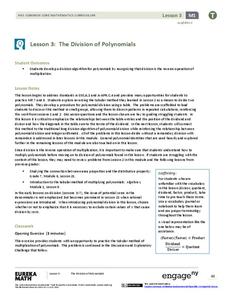










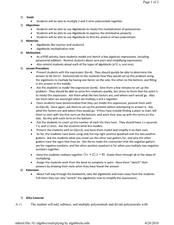

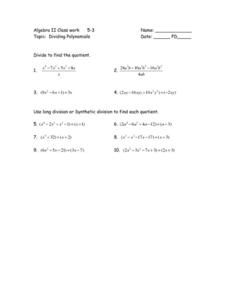
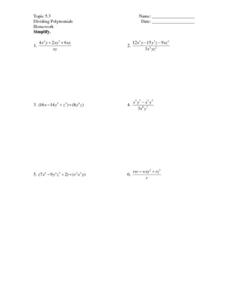

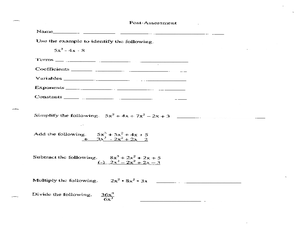
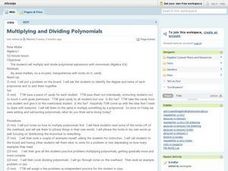
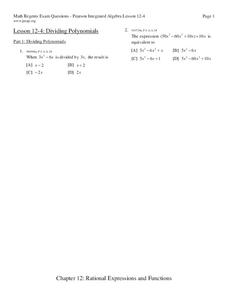
![WORKSHEET # 8 [4.4, 4.5, 4.6, 4.7, & 4.8] Lesson Plan WORKSHEET # 8 [4.4, 4.5, 4.6, 4.7, & 4.8] Lesson Plan](http://content.lessonplanet.com/resources/thumbnails/160775/large/cgrmlwnvbnzlcnqymdezmdmzmc04ntg3ltf4ztu1dtquanbn.jpg?1414261468)
